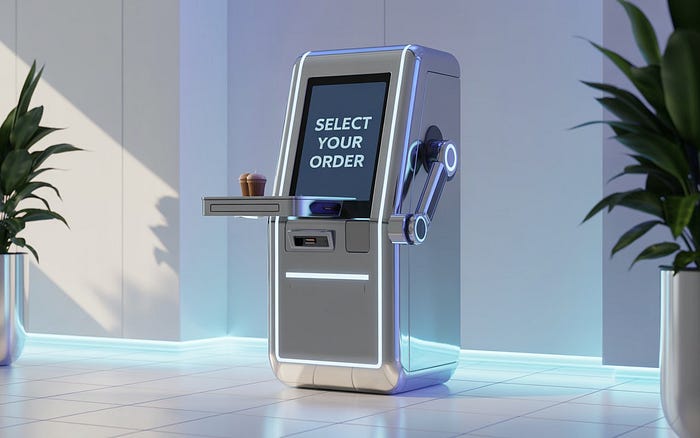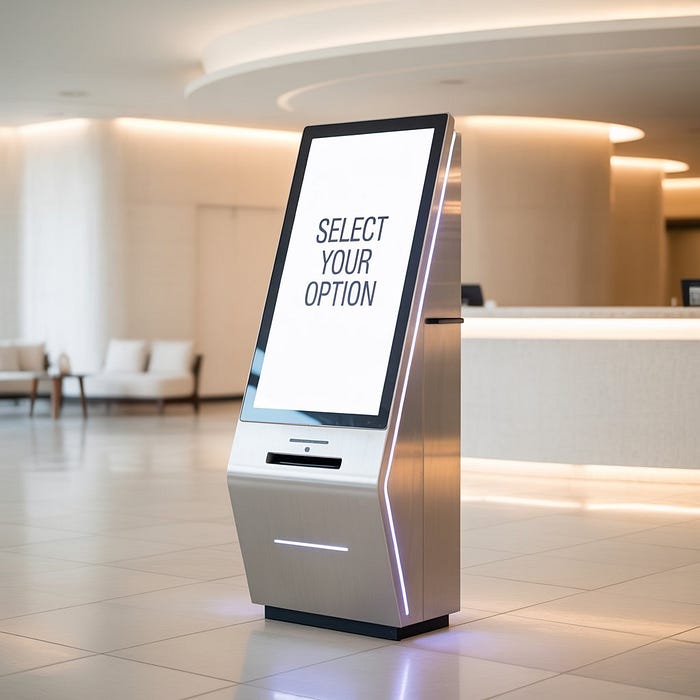- Get link
- X
- Other Apps
- Get link
- X
- Other Apps

As businesses increasingly adopt kiosk solutions to streamline operations and improve customer experiences, sustainability is becoming a key focus. Eco-friendly kiosk practices are not just a trend — they represent a strategic investment for both the environment and long-term business success.
Whether you’re running a food kiosk, ticketing booth, or a digital self-service station, integrating green practices can significantly reduce operational costs, enhance brand reputation, and attract eco-conscious consumers. From energy-efficient lighting to sustainable materials and smart water usage, there are countless ways to make your kiosk more environmentally responsible.
This blog explores practical strategies to make your kiosk eco-friendly — helping both your bottom line and the planet.
Energy Efficiency Strategies
Energy consumption is one of the largest ongoing costs for kiosk operations. Fortunately, optimizing your energy use can lead to substantial savings while reducing your carbon footprint.
Use LED Lighting
Lighting is essential for visibility, safety, and attracting customers, but traditional bulbs consume a lot of energy. LED lighting is a superior alternative due to its energy efficiency and longevity.
Benefits of LED lighting:
- Uses up to 80% less energy than incandescent bulbs
- Lasts 25 times longer, reducing replacement costs
- Emits less heat, lowering cooling needs
Installing LED lighting in signage, display panels, and the kiosk interior can lead to a significant drop in electricity bills. Many modern LED systems also support dimming and smart control features for further energy savings.
Implement Motion Sensors and Timers
Motion sensors and timers help control when lights and electronic devices are on. This ensures energy is only used when necessary.
How they help:
- Turn off lights and screens during inactivity
- Reduce idle energy consumption
- Enhance security by detecting unauthorized access after hours
Timers can be programmed to turn on equipment just before peak hours and shut it down during off-peak times. These systems are especially effective for kiosks operating in malls or transport hubs with predictable foot traffic patterns.
Choose Energy-Efficient Appliances and Equipment
Investing in ENERGY STAR-certified or equivalent appliances for refrigeration, cooking, or digital displays can yield substantial energy savings over time.
Examples include:
- Low-power POS systems
- Efficient HVAC or ventilation units
- Monitors and screens with eco-mode settings
Though these appliances may have a higher upfront cost, the energy savings typically offset the investment within a short period.
Sustainable Materials and Waste Reduction
The construction and day-to-day operations of kiosks contribute to material consumption and waste generation. Sustainable design choices and waste management can drastically reduce environmental impact.
Opt for Recycled and Eco-Friendly Materials
Choosing sustainable materials in kiosk construction not only reduces the use of virgin resources but also lowers the carbon footprint of manufacturing and transportation.
Popular eco-friendly materials:
- Reclaimed wood for counters and framing
- Recycled aluminum or steel for structural components
- Biodegradable plastics for interior panels or product packaging
Incorporating these materials doesn’t mean sacrificing design. In fact, eco-kiosks often stand out for their unique aesthetic appeal and commitment to sustainability.
Implement Recycling and Composting Programs
Even a small kiosk can generate significant waste, especially if it deals with food or disposable products. Setting up a recycling and composting system helps reduce landfill waste and shows customers you care about the environment.
Best practices:
- Provide clearly labeled bins for paper, plastic, and compost
- Partner with local recycling services
- Train staff to sort waste correctly
Customers appreciate visible recycling efforts, especially in public or food-serving environments.
Minimize Single-Use Plastics
Plastics are one of the biggest environmental pollutants. Replacing single-use plastic items with reusable or compostable alternatives is a powerful step toward sustainability.
Eco-friendly alternatives:
- Compostable food containers and cutlery
- Reusable cups and bags for repeat customers
- Digital QR menus instead of plastic menu cards
Encouraging customers to bring their own containers or offering incentives for reusable items can reinforce a green culture around your kiosk.

Water Conservation Techniques
Water usage might not seem like a concern for all kiosks, but for those in the food and beverage industry, water waste can add up. Conservation techniques help lower utility costs and preserve a vital natural resource.
Install Low-Flow Faucets and Fixtures
Low-flow faucets, aerators, and water-efficient dishwashers can reduce water usage by up to 60% without compromising hygiene or effectiveness.
Why it matters:
- Reduces water bills
- Lowers strain on local water supplies
- Supports green certifications (e.g., LEED)
These fixtures are inexpensive, easy to install, and can make a big difference in both savings and environmental impact.
Use Water-Efficient Cleaning Practices
Traditional cleaning routines often involve excessive water. Training staff to clean more efficiently saves both water and labor.
Simple changes:
- Use microfiber cloths that require less water
- Switch to spray bottles instead of buckets
- Clean spills immediately to avoid intensive wash-downs later
Kiosks can also consider investing in eco-friendly cleaning products that are biodegradable and less toxic to the environment.
Eco-Friendly Operational Practices
Your daily operations offer many opportunities to implement eco-conscious practices that require little to no upfront investment.
Digitize Receipts and Paperwork
Going paperless is a cost-effective and environmentally sound move. Many POS systems now offer digital receipts via email or SMS.
Advantages:
- Reduces paper costs and printer maintenance
- Enhances customer convenience
- Minimizes waste
For internal operations, use cloud-based platforms for inventory, scheduling, and communication to eliminate unnecessary paper usage.
Source Local and Organic Products
If your kiosk offers consumables, sourcing from local vendors and choosing organic products helps reduce transportation emissions and supports eco-friendly farming.
Benefits:
- Fresher, higher-quality ingredients
- Builds local business relationships
- Reduced environmental impact from shipping and packaging
Often, customers are willing to pay a premium for local, organic, or sustainably-sourced options.
Educate Staff on Sustainable Practices
Employees are the backbone of any kiosk operation. Training them in sustainability ensures consistency and commitment to eco-friendly policies.
Training topics:
- Energy and water-saving habits
- Proper waste disposal and recycling
- Encouraging customer participation in green initiatives
Ongoing workshops and incentives can help keep your team motivated and aligned with your sustainability goals.
Financial Incentives and Community Engagement
Becoming eco-friendly isn’t just about cost savings — it’s also about leveraging your sustainable choices to attract customers, build partnerships, and access financial support.
Utilize Government Rebates and Grants
Many local and national governments offer rebates, tax deductions, or grants for adopting sustainable practices.
You can receive incentives for:
- Installing solar panels or energy-efficient lighting
- Using recycled materials
- Purchasing water-saving fixtures
Check with your municipality or energy provider for available programs tailored for small businesses and kiosk operators.
Engage with Local Environmental Initiatives
Collaborating with local green organizations not only builds goodwill but also connects your business to a network of eco-conscious consumers.
Ideas for engagement:
- Sponsor local clean-up events
- Donate a portion of profits to environmental causes
- Join green business networks or certification programs
These efforts strengthen your brand reputation and often generate positive media or social coverage.
Promote Your Eco-Friendly Efforts
Sustainability is a strong selling point — don’t keep it a secret. Promote your green initiatives through your signage, website, and marketing materials.
Marketing ideas:
- Use eco-labels or certifications (e.g., Green Business Certified)
- Share sustainability stories on social media
- Offer green loyalty programs for eco-conscious customers
Being transparent about your environmental efforts can win customer trust and long-term loyalty.
Conclusion
Embracing eco-friendly practices in kiosk operations is a win-win scenario. By focusing on energy efficiency, sustainable materials, water conservation, and eco-conscious daily operations, businesses can significantly reduce costs while also making a positive impact on the environment.
These changes don’t need to happen all at once. Start small — swap out bulbs for LEDs, digitize receipts, or set up a recycling station. Over time, build toward comprehensive sustainability with smart equipment, local sourcing, and community engagement.
Customers are increasingly choosing businesses that align with their values. By going green, your kiosk not only saves money but also positions itself as a forward-thinking, responsible brand in a world that urgently needs more of them.
Comments
Post a Comment